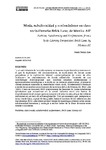Moda, subalternidad y ecofeminismo en clave socio-literaria: Brick Lane, de Monica Ali

View/
Use this link to cite
http://hdl.handle.net/2183/32687
Except where otherwise noted, this item's license is described as Atribución-CompartirIgual 4.0 Internacional (CC BY-SA 4.0)
Collections
Metadata
Show full item recordTitle
Moda, subalternidad y ecofeminismo en clave socio-literaria: Brick Lane, de Monica AliAlternative Title(s)
Fashion, Subalternity and Ecofeminism from a Socio-Literary Perspective: Brick Lane, by Monica AliAuthor(s)
Date
2023-01-09Citation
Pereira Ares, Noemí (2023). Moda, subalternidad y ecofeminismo en clave socio - literaria: Brick Lane, de Monica Ali. Atlánticas. Revista Internacional de Estudios Feministas, 8 (1),169-191. doi: https://dx.doi.org/10.17979/arief.2023.8.1.8711
Abstract
[Resumen] La actual industria de la moda encierra un sistema de producción y consumo en el que la explotación del medioambiente, la explotación de ciertas zonas geográficas y la explotación laboral —principalmente de mano de obra femenina— se interrelacionan de forma indisoluble. Partiendo de una metodología interdisciplinar que combina estudios ecofeministas y aproximaciones sociológicas a la moda en un contexto postcolonial, el presente trabajo persigue examinar la interrelación entre moda, subalternidad y ecología a través de un análisis socio-literario de la novela debut de Monica Ali, Brick Lane (2003). Como se mostrará, Brick Lane entreteje las historias de varias subalternas spivakianas que encuentran en la actual industria textil una fuente de empoderamiento al tiempo que sus cuerpos y el entorno natural que las rodea se convierten en un foco de sobreexplotación. Con un escenario que transporta al lector desde Daca, capital de Bangladés, hasta el Londres de los talleres textiles clandestinos, Brick Lane ofrece un sutil retrato de la ambigua relación entre moda, subalternidad femenina y ecología a ambos lados de la línea divisoria entre oriente y occidente. [Abstract] The fashion industry entails a system of production and consumption in which the exploitation of the environment, the exploitation of certaingeographical areas and labour exploitation—mainly female labour—
are inextricably interrelated. Drawing on an interdisciplinary methodology that combines ecofeminist studies and sociological approaches to fashion in a postcolonial context, this paper aims
to examine the interrelationship between fashion, subalternity and ecology through a socio-literary analysis of Monica Ali's debut novel, Brick Lane (2003).
As will be shown, Brick Lane weaves together the stories of several Spivakian subalterns who find in the current textile industry a source of empowerment
while their bodies and the natural environment that surrounds them become a focus of overexploitation. With a setting that walks the reader from Dhaka, the
capital of Bangladesh, to the London of sweatshops,
Brick Laneoffers a subtle portrayal of the ambiguous relationship between fashion, female subalternity,
and ecology on both sides of the East-West divide.
Keywords
Moda
Subalternidad
Ecofeminismo
Brick Lane
Monica Ali
Fashion
Subalternity
Ecofeminism
Subalternidad
Ecofeminismo
Brick Lane
Monica Ali
Fashion
Subalternity
Ecofeminism
Editor version
Rights
Atribución-CompartirIgual 4.0 Internacional (CC BY-SA 4.0)
ISSN
2530-2736






